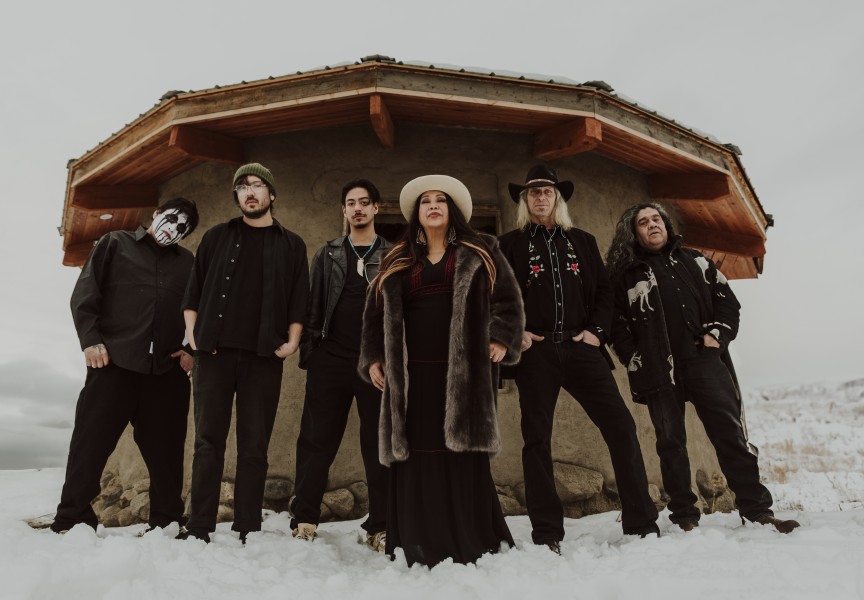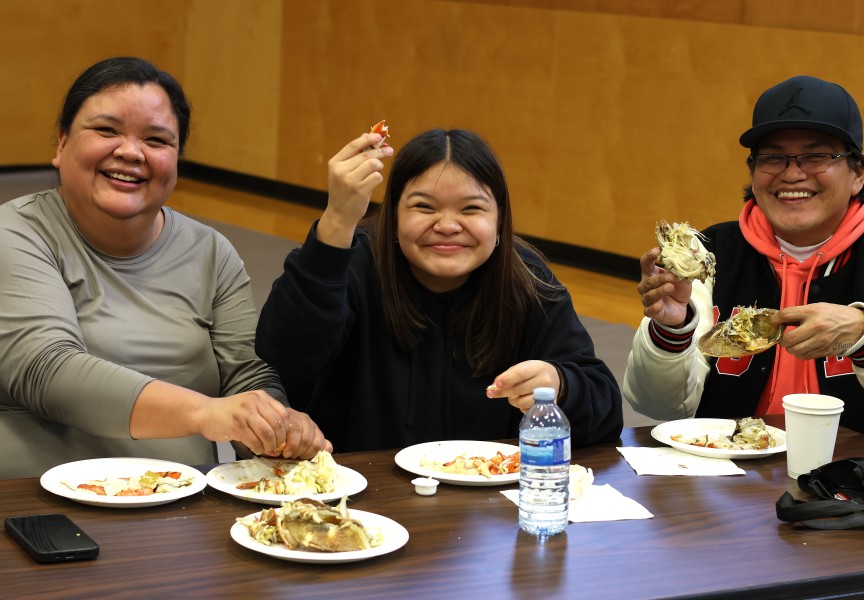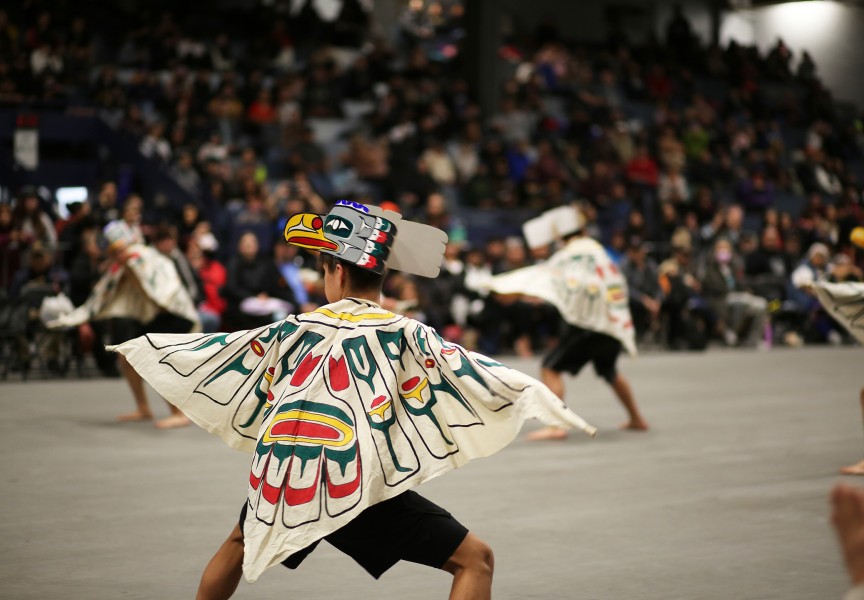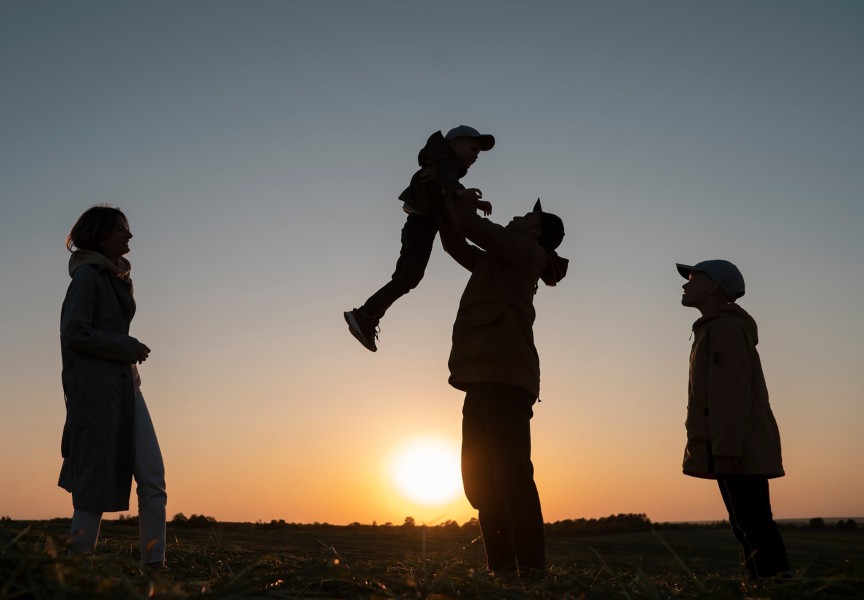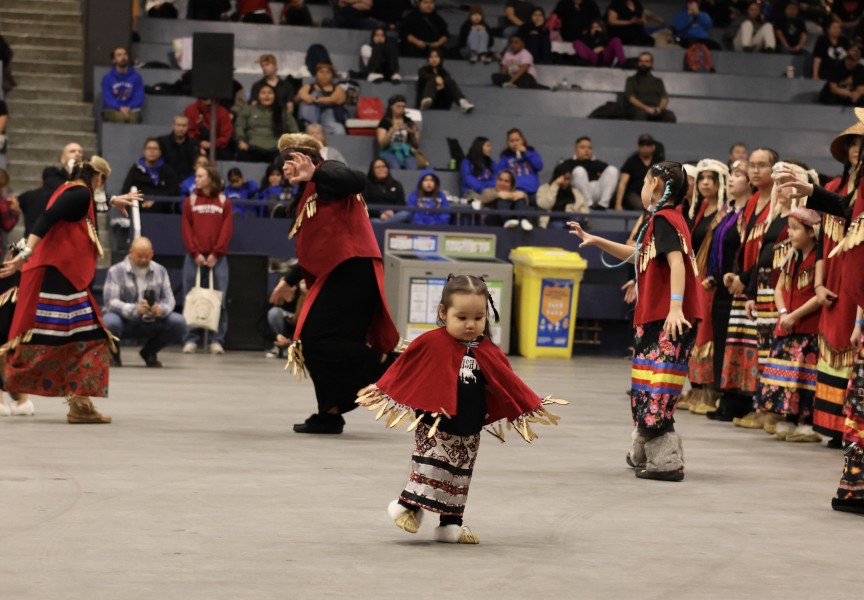Ten years ago, Hesquiaht First Nation and Yuułuʔiłʔatḥ elder Nicki Love McCarthy asked Nuu-chah-nulth knowledge keepers if they knew of any words that described queerness.
Through a flurry of texts, emails and Facebook messages, the knowledge keepers were able to bring these words forward, and McCarthy generously shared them during a Sunday, April 13 afternoon presentation in the Sičquuʔuƛ (Sitch – KHOO – ootl) Theatre in Pacific Rim National Park Reserve’s Kwisitis Visitor Centre.
Sičquuʔuƛ is the late Barbara Touchie’s Nuu-chah-nulth name and means “a dorsal fin coming around a point of land”. Touchie was dedicated to revitalizing Nuu-chah-nulth language and culture. Parks Canada renamed the theater after her in 2016.
“I’m very grateful for the language people. Our words are so beautiful and very concise and very direct,” said McCarthy, who describes herself as a new kind of elder, poet, writer and researcher, committed to redistributing ancestral teachings in a contemporary society.
She is also the central regional coordinator for the Nuu-chah-nulth Tribal Council’s Teechuktl Mental Health Services.
“Barbara was a great, beautiful human and storyteller. She said that if we can learn the international phonetics, we can speak the language,” said McCarthy. “That was a big shift, I think. As I say, becoming of the language, we have to learn to read it so that we can speak it.”
She thanked all the grannies, with a particular tribute to her Granny Louise McCarthy, the lady who never forgot anything, for being the best knowledge carriers of all.
With only a handful of fluent speakers left, Nuu-chah-nulth is a language on the brink.
“But fortunately, we have folks that are bringing it back and keeping it alive,” said McCarthy.
Supported by the Coastal Queer Alliance and the Clayoquot Biosphere Trust, McCarthy’s talk on Nuu-chah-nulth queer language included a special tale of the Two-Spirit creation story.
McCarthy said she wrote the Two-Spirit creation story herself because other than a story from the Ojibwe area about warriors dancing around the trans women to win their love before going to war, there was no other story out there.
“Long after I turn to dust, I want to leave something behind, and I’m hoping that this story stays,” she told the audience before telling her Two-Spirit himwic̓a (gentle way of teaching).
One version of the story tells a time before light. A dark time, which light was kept secretly in a hoopaquinum guarded by the great Chief. The Chief of all Chiefs. Raven heard of this light, as they like shiny things, and wanted the light and attempted many times, trying to release it but failed.
One day, he had a new idea. He transformed himself into an Indian tea leaf and put himself in a small food box of the great Chiefs’ daughter. She ate the tea leaf and in due time gave birth to Son of Raven.
The reborn Raven asked his new now grandfather, the great Chief, to see the light in the hoopaquinum. The great Chief eventually agreed and opened the box, showing the light.
Son of Raven transformed himself once again, this time back into Raven. He stole the light and he bit down hard on it not knowing a large piece of light fell off and back down into the hoopaquinum.
Raven flew high into the sky carrying the light with him, creating the sun that shines down on us today.
The great Chief saw the large piece of light left behind in the hoopaquinum nestled between his dancing shawl and his whale bone war club, he asked the light, ‘What do you want to be?’
The light wanted to be human and picked up the essence of the dancing shawl and the war club. So the great Chief transformed the light into the first Two-Spirit Nuu-chah-nulth.
“Living in each and every Two-Spirit Nuu-chah-nulth today is that light,” McCarthy continued. “So be that light and shine on to the world. Let them see how bright you are within your community. I need you here. Our queer people need you here. I thank you for shining your light onto others. I thank you for shining the best parts of you. For my queer folk, you are the greatest act of human love that you are here.”
After McCarthy’s talk, participants were invited to hold and ask questions about whale bones she carved to resemble traditional tools found pre-contact. McCarthy also showcased an orca tooth necklace, eagle feather fans, fox tails and salmon fish skin leathers, which she wants to turn into a dress.
Hesquiaht Two-Spirit artist Naasʔi ʔawatin led the group in a screen printing workshop following McCarthy’s redistribution of queer language knowledge.
Naasʔi ʔawatin said their design was inspired by McCarthy’s personal logo and represents Two-Spirit, with two faces topped with an orca fin, wolf and eagle.
“The animals guide in our culture, the wolf is usually a guardian spirit. It changes obviously nation to nation. The eagle is a guide, high above seeing the world, and the orca whale is the holder of ancestral wisdom,” they explained.
Queer folk in the Nuu-chah-nulth community were traditionally name givers, according to McCarthy. Two-Spirits would settle disputes and were often called Uuštukyuu (pronounced oosh-tuck-uu), meaning ‘someone who can see things that other people can’t’.
Here is the list of Nuu-chah-nulth queer language words McCarthy shared, noting that she respectively acknowledges regional dialects of the words and language is never static, but always becoming.
- ʔaƛac̓u (Two-Spirited): A term representing the blending of masculine and feminine energies.
- łuučuk (More Like a Lady): A respectful acknowledgment of femininity.
- čakupšiƛ- (Became a Man): Referring to gender transformation.
- łuucmackʷi - (Was a Woman): Recognizing feminine identity.
- kʷissuuqƛ (Queer, Non-Hetero-Normative) Affirming diverse sexual orientations and gender expressions



